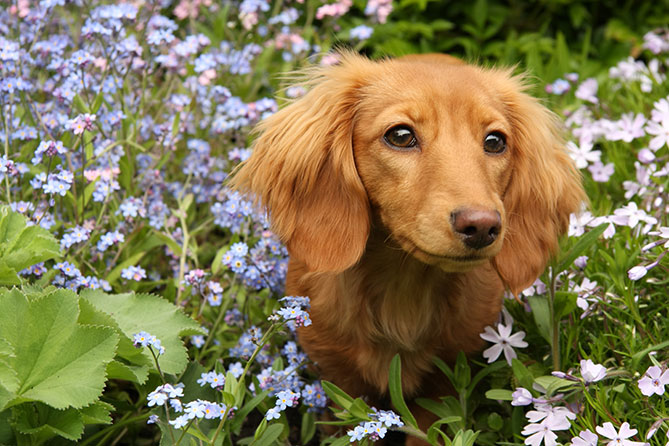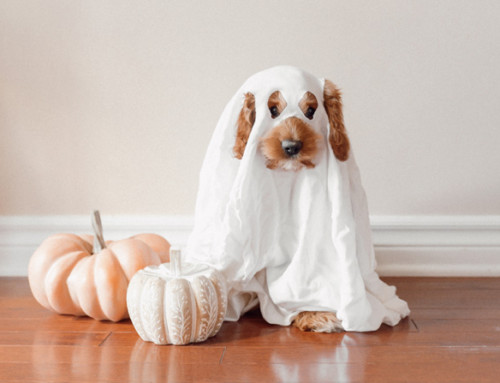Create a place where your plants and pets can flourish in harmony. This guide will help you choose the best pooch-friendly plants that are safe to have around dogs. Read on and learn how to keep your best friend safe.
Some dogs just can’t help themselves when it comes to chewing, nibbling and eating almost anything – and the contents of our gardens are no exception. While many gardens contain plants that can be harmful to humans, but which are completely safe for dogs, it’s still a good idea to make sure your garden is free of absolutely anything that might cause your dog harm. Dogs are unpredictable at the best of times, so you never know if they might suddenly decide to make your plants a tasting platter.
Read on to find out what plants are best for a dog-friendly garden. Remember, it’s not just about shade, securing the perimeter, and a place to play. Shield your friend from all possible harm by following our guide to plants that are safe for pets.
Plan the structure first
Too much open dirt may lead to your dog digging up a storm, and you know they are happy to traipse carefree right through your flowerbeds with the most delicate blooms. Shrubberies, garden beds and wire enclosures (especially during your plants’ establishment time) time may be necessary. These can protect your plants and your pooch alike.
The best flowers for dogs
Some of your favourite blooms may be poisonous to your dog – did you know that daffodil bulbs, Bergenia (elephant’s ears) and yew are all highly toxic to puppers? Here are some flowers that are safe for dogs:
Forsythia: Bursting with sunshine, Forsythia will brighten up any yard with its vivid yellow colour. You can have a single plant or grow this flower as a hedge.
Echinacea: These daisy-like flowers are a pretty addition to any garden bed, and hardy enough to survive without much attention, even during dry spells Echinacea can even be used to make your own immune-boosting medicine come cold and flu season – it might even be good for your dog to have a chew on these leaves!
Buddleja: This plant has gorgeous purple and white flowers when in bloom, and will attract butterflies and bees to your garden as well. It’s also a relatively no-fuss flower variety.
Lilac: This ornamental shrub adds gorgeous purple flowers and a sweet scent to your yard.
Safe succulent plants for your dog-friendly garden
Certain common succulents like jade plant and aloe vera are bad news for dogs, but you can keep enjoying them as long as they are potted, up high and away from curious snouts. Houseleek is an easy-care succulent that looks great in rock gardens, pots and garden beds. Like most succulents they require very little care, and are happy in varying degrees on sunshine with a little water now and then. Other succulents that aren’t dangerous to dogs include hens-and-chicks, ponytail palm, burro’s tail and Christmas cactus.
Dog-friendly herbs and vegetables
Veggies and fruits can be shared with dogs as part of a balanced diet – but be warned, you might have to fence off your garden from greedy pups!
The following types of fruits and veggies are safe for dogs to eat in small quantities: apples, bananas, watermelon, strawberries, oranges, blueberries, carrots, capsicums, broccoli, cucumber, celery, pears, potatoes, peaches, raspberries, artichokes, cranberries, lettuce, pumpkin, peas, radishes, silver beet, zucchinis, and mango.
Dog friendly herbs include: basil, mint, and parsley.
Plant some dog’s bane
This herb has a strong minty odour that dogs intensely dislike, so it could be a good deterrent if there are some poisonous plants in your garden that you just can’t part with, but that you want to keep your dog away from. In this instance, make sure the garden bed is very well surrounded. Dog bane is in the mint family, and its scent will also keep cats out of your garden bed.
Only use all-natural mulch and fertiliser
Commercial chemical fertilisers can make pets sick, and can be deadly if ingested accidentally. Instead, make your own fertiliser with compost scraps from the kitchen. This has the added benefits of saving you money, and from being exposed to intense chemicals yourself. You can also make your own mulch by saving your grass clippings and compacting them solidly around freshly planted additions to your garden. These will have the added benefits of hiding all that churned earth, which looks like an irresistible invitation to dig to your dog.
Go for some ground cover
Ground cover plants are another way to avoid too much tempting open soil in your garden. They also look lovely, and are an all-natural way to choke out weeds. Elfin thyme, miniature stonecrop, Labrador violet and Irish moss are some hardy ground cover varieties that will stand up to your dog’s frolicking.
Dead patches on your lawn
Dogs love to patrol the yard, but this can result in the lawn being worn in certain parts. If you notice this, it may be a sign your dog needs more exercise. If you step up walking and your dog is still running laps outside, you can put in some pathways with pavers, gravel or mulch on the most often trodden areas. Have a read of our blog post 8 Easy Tips for Walking an Energetic Dog for inspiration on upping your pup’s workout routine.
A garden your pooch will love
So there you have it, a guide to creating a happy yard space for you and your pet. Not only will you have a lovely backyard filled with vibrant plants, flowers and herbs, but now you can be safe in the knowledge your furry friend will be free from any potential harm. We wish you many a happy time in the garden together!







Second post to read. First one said all mints were unsafe.
Conflicting info on the web? Go figure.
Hi Bill, thanks for your feedback. We will review the article – but if you want to be on the safe side, avoid mint – even if it is a plant in the mint family, rather than pure mint. Kind regards, Liz
Any Australian native climbing plants that would be recommended safe for dogs.
Most seem to have seed pods that are poisons
Hi there, I have been researching plants to plant in my backyard that are safe or non toxic to dogs. Each time I read an article that suggests a plant that is safe I look it up at the ASPCA’s website for plants safe or not. I found your article and was interested in the dogbane however per the ASPCA it states it is toxic to dogs, cats & horses.
Additional Common Names: Bitterroot, Indian Hemp
Scientific Name: Apocynum spp.
Family: Apocynaceae
Toxicity: Toxic to Dogs, Toxic to Cats, Toxic to Horses
Toxic Principles: Cardenolides
Clinical Signs: Diarrhea (possibly with blood), slow heart rate, weakness
What some dog owners may not know is that there are some plants and flowers that are dangerous to our furry family members. It is better to do some research about our garden and plants to prevent dogs from getting poisoned. Also, train your dogs not to eat anything else. In the worst case, call your vet once your dog got poisoned.
I am interested to know are the same plants/shrubs safe for cats.
Hello Marg – you may find this list is helpful. https://www.petprofessional.com.au/info-centre/educating-owners-on-poisonous-plants-for-pets/